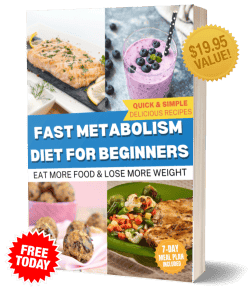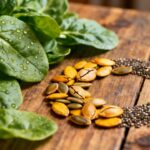Research has shown that consuming certain foods will harm your prostate gland, worsen prostate problems, and potentially increase the risk of prostate cancer.
In this video, you’ll learn the 7 worst foods for prostate health, and the exact reasons why they are bad for your prostate. Check it out and consider reducing these foods consumption, or avoid if you have an enlarged prostate.
Make sure to watch till the end of this video, because you will also learn some best foods for prostate health, and why they can help you shrink enlarged prostate naturally and boost your prostate health.
What Is Prostate Gland?
The prostate is a walnut-shaped gland that is part of the male reproductive system. It sits just below the bladder, surrounds the urethra, and in front of the rectum.
Its main function is to add fluid to semen, help push semen through the urethra, and regulate hormone production and urine flow.
Enlarged prostate (also known as Benign Prostatic Hyperplasia or BPH) is one of the most frequent medical conditions in elderly men.
BPH affects 50% of men aged 51 to 60 and up to 90% of men older than 80. It can cause frequent urination at night, weak urine stream, incontinence, and urinary retention.
Worst Foods for Prostate Health
After knowing the basics of the prostate and BPH, now, let’s explore the 7 worst foods for prostate health that you should avoid eating to keep you away from prostatitis, enlarged prostate, and prostate cancer.
1. Processed foods
Processed foods seem to become an integral part of modern diets. However, processed foods are often loaded with high levels of unhealthy fats (trans fats & saturated fats), excessive amounts of sodium, additives, preservatives, and artificial ingredients.
This is because processed foods have undergone various manufacturing processes to extend their shelf life, enhance flavors, and improve convenience. These components contribute to inflammation, oxidative stress, and hormonal imbalances, which can negatively impact prostate health.
A population-based case-control study, conducted in Montreal, Canada from 2005 to 2012, showed that higher intakes of processed foods are associated with an increased risk of prostate cancer.
You’d better reduce or avoid the consumption of processed foods, which include fast food, processed meats, packaged snacks, canned food, ready-to-eat meals, soft drinks, ham, and sausage rolls.
Pay more attention to food labels and ingredient lists before buying and choose options with minimal additives and preservatives.
2. Alcohol
Alcohol is a diuretic, which can cause you to urinate more frequently and make prostate problems worse. And alcohol is a solvent that can damage liver cells and cause hormonal imbalance.
On the other hand, alcohol can interfere with many medications. When mixing alcohol with alpha blockers like tamsulosin (Flomax) and silodosin (Rapaflo), it may increase the risk of low blood pressure and possible fainting upon standing.
Researchers in the Prostate Cancer Prevention Trial found that heavy alcohol consumption (≥50 g alcohol/day) and regular heavy drinking (≥4 drinks/day on ≥5 days per week) were associated with increased risks of high-grade prostate cancer.
And there are other studies showed that many men who gave up alcohol had improved their prostatitis symptoms. It is wise to avoid heavy drinking or quit alcohol consumption, if you have an enlarged prostate.
3. Caffeine
Caffeine, the major ingredient in coffee, is popular for its stimulating effect on the human body. But caffeine has an issue that’s similar to that of alcohol. They both act as a diuretic and increase urine output.
Furthermore, caffeine is a urinary tract irritant that causes extra symptoms that alcohol does not.
Study results from National Health and Nutrition Examination Surveys (NHANES) showed that caffeine consumption equivalent to approximately 2 cups of coffee daily (250 mg) is significantly associated with moderate to severe urinary incontinence in United States men.
All caffeinated beverages like coffee, sodas, and energy drinks, should be avoided entirely by men with prostate problems.
Though caffeine can be beneficial when consumed in moderation, a normal man should consume no more than 400mg of caffeine a day, which is approximately 4 cups of coffee.
4. Spicy foods
Anyone with urinary problems should stay away from spicy foods. While caffeine is a diuretic and mild irritant, spicy foods and chili are strong irritants of your bladder and prostate.
They could exacerbate prostate inflammation and worsen urinary symptoms, including urgency, incontinence, and burning during urination, especially in men with a history of prostatitis.
National Institutes of Health conducted a survey of men with chronic prostatitis, 47.4% reported that the consumption of spicy foods, chili, and hot peppers aggravated their prostatitis symptoms.
Yet, not all spicy foods are necessarily bad. For example, spicy peppers contain a compound called capsaicin, which has been shown to have some benefits for the prostate.
But the problem is that the benefits of capsaicin may not outweigh the negatives here, so when you’re in doubt, just skip the heat.
5. Sugar
Sugar is abundant in many foods, such as cake, sodas, candies, desserts, and sweetened snacks. It is often added to processed foods to give them extra flavor.
Sugary foods contribute to elevated blood sugar levels, weight gain, inflammation, and other negative effects on overall health.
High sugar intake not only triggers inflammation in the prostate, but also can lead to insulin resistance, where the body’s cells become less responsive to insulin. This hormonal imbalance can disrupt prostate health and contribute to the development of prostate issues.
Evidence from the National Health and Nutrition Examination Survey (NHANES) showed that the total dietary intake of sugars is independently and positively associated with serum prostate-specific antigen (PSA) concentrations in adult American males who are without a personal history of malignant tumors.
You’d better swap sugary foods and beverages with fresh fruits, vegetables, nuts, and seeds. Not only are these better for the prostate, but they are also highly nutritious and healthy too!
6. Fried foods
Fried foods are thought to be delicious, and the modern world labeled them as “comfort food”. However, fried foods often contain high levels of unhealthy fats, trans fats, and oxidized oils.
The process of frying foods at high temperatures leads to the formation of harmful compounds and free radicals. These components contribute to systemic inflammation, and oxidative stress, and can negatively impact prostate health.
Researchers from Fred Hutchinson Cancer Center found that regular consumption of select deep-fried foods is associated with increased prostate cancer (PCa) risk.
Minimize or avoid the consumption of fried foods such as French fries, fried chicken, and deep-fried snacks. And opt for healthier cooking methods such as baking, grilling, or steaming, and healthier fats such as olive oil, avocado oil, or coconut oil. These fats contain beneficial compounds that support prostate health.
7. Dairy
Dairy products, particularly full-fat varieties, are often high in saturated fats, which can trigger inflammation in our bodies.
And some dairy products, such as cow and goat milk, may contain naturally occurring hormones or added hormones used in the farming industry. These hormones can potentially interfere with hormonal balance in your body and affect prostate health.
Several studies have indicated a potential association between high dairy consumption and an increased risk of prostate cancer.
The specific mechanisms are still being investigated, but it is believed that hormones and other compounds in dairy may contribute to this risk.
For normal adults, moderate consumption of dairy foods can be healthy and nutritious.
If you have prostate problems, you’d better limit or quit your intake of dairy foods, especially those high in saturated fats. And consider adding dairy alternatives like almond milk, soy milk, or oat milk into your diet. These options can provide essential nutrients without the potential negative impact on prostate health.








